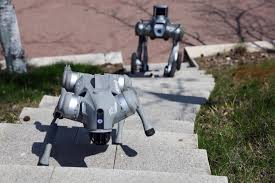China is intensifying its push into autonomous military technology through an ambitious initiative known as “DeepSeek.” The program focuses on developing AI-powered robot dogs and coordinated drone swarms, marking a major step in Beijing’s mission to redefine modern warfare through artificial intelligence.
AI at the Core of Modern Warfare
According to a report from Reuters, the goal of DeepSeek is to create self-directing combat systems that can operate with minimal human intervention. These include quadruped robotic units for reconnaissance and frontline logistics, alongside AI-driven drones capable of real-time communication and coordinated maneuvers during military operations.
Such systems represent a strategic pivot from traditional weapons to networked, intelligent warfare — where decisions are made faster, data is processed instantly, and machine units can collaborate autonomously in the field.
Transforming Battlefield Dynamics
Defense experts believe that technologies like autonomous drone swarms and robotic ground units could radically alter global defense strategies. Swarming drones, guided by AI algorithms, can overwhelm enemy defenses, perform surveillance, or deliver precision strikes in synchronized formations. Meanwhile, robotic quadrupeds could support human troops by navigating hazardous terrain, transporting supplies, or relaying tactical data.
“This is not just an arms race — it’s an algorithm race,” said Dr. Mei Zhang, a Beijing-based defense analyst. “Whoever masters adaptive, autonomous systems will dominate the future battlefield.”
Synergy Between Tech and Defense
The DeepSeek program reportedly unites China’s top defense contractors, AI startups, and research institutions, reflecting a powerful convergence between civilian innovation and military application. The project aligns with Beijing’s broader strategy to leverage AI, robotics, and data analytics for national defense — part of its long-term goal to achieve technological parity with, or superiority over, Western militaries.
Ethical and Strategic Concerns
Despite the technological breakthroughs, global security experts are raising alarms about the potential dangers of autonomous warfare. The absence of human oversight could lead to unpredictable battlefield behavior, accountability challenges, and escalation risks in international conflicts. There are also growing calls for international regulations to govern the development and deployment of AI-driven weapons systems.
The Future of Intelligent Warfare
As global powers race to dominate the next era of defense technology, China’s DeepSeek initiative underscores a fundamental shift: the soldier of the future may not be human. Intelligent machines — capable of acting independently or alongside human troops — are becoming central to military modernization worldwide.
Whether viewed as innovation or escalation, DeepSeek signals that the age of AI warfare has arrived — and the balance of global power may soon depend on who commands the smartest machines.

